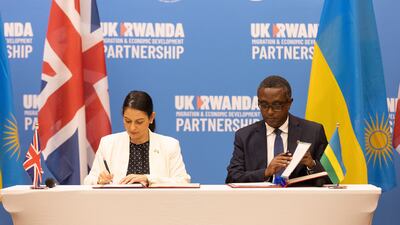The top official in Britain's Home Office questioned plans to send asylum seekers to Rwanda because he doubted whether they would deter people from crossing the English Channel in small boats.
Matthew Rycroft, the permanent secretary in the department, put his misgivings in writing a day before Home Secretary Priti Patel announced the controversial plans.
His letter invoked a procedure called a ministerial direction in which Ms Patel responded with a written order overruling Mr Rycroft's concerns.
She wrote it would be “quite imprudent” for a lack of detailed modelling on the Rwanda plans to delay a policy “we believe will reduce illegal migration, save lives and ultimately break the business model of the smuggling gangs".
The letters were published by the government, confirming media reports, amid a political storm over the Rwanda plans. Archbishop of Canterbury Justin Welby weighed in during his Easter Sunday sermon to condemn the proposals.
Ministers said sending illegal migrants to Rwanda will discourage them from attempting the perilous English Channel crossing, while offering sanctuary in the African country to people in genuine need. About 5,000 people are thought to have made the journey from northern France this year.
While human rights groups say the policy is cruel and may breach international law, Mr Rycroft's letter in his role as Home Office accounting officer focused on the financial prudence of the plans.
He said the plans to spend money flying people to Rwanda, and investing money in the country as part of the deal, might represent poor value for the taxpayer.
“Value for money of the policy is dependent on it being effective as a deterrent,” he wrote in his letter to Ms Patel.
“Evidence of a deterrent effect is highly uncertain and cannot be quantified with sufficient certainty to provide me with the necessary level of assurance over value for money.”

Under the ministerial direction procedure, Mr Rycroft requested a written order to proceed with the policy despite his misgivings, which Ms Patel provided the same day.
He did not raise any doubts about the propriety, regularity or feasibility of the policy, the other criteria which permanent secretaries are supposed to consider besides value for money.
In her response, Ms Patel said it was not possible to model the deterrent effect “from day one” but that “we are confident this policy is our best chance at producing that effect".
Her letter also cited the “soaring costs” of illegal migration, including £4.7 million ($6.1m) a day on hotels, and the well-being of Home Office and Border Force staff dealing with an under-pressure asylum system as justifications for moving ahead.
“I recognise your assessment on the immediate value for money aspect of this proposal. However, I note that without action, costs will continue to rise, lives will continue to be lost,” she said. “I also think there are credible invest-to-save arguments in the long term.
“It would therefore be imprudent in my view, as Home Secretary, to allow the absence of quantifiable and dynamic modelling … to delay delivery” of the policy, she said.


